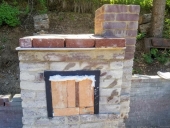posted 5 months ago
You may have to look around a lot to find clay in the ground. One thing I noticed when I got my property was the sand road going to it had a number of ant hills around, and a couple of them had red clay mixed in, while others didn't. So I could benefit from their effort to find places where clay is much closer to the surface. It's possible right where you live doesn't have any easy access to good clay, but perhaps not too far away is some place like a construction site that is digging stuff up where you can see they have clay. From there you could ask the workers if you can grab a sample, or perhaps ask other people nearby.
If you can find anyone working with pottery, you may be able to get your hands on some free broken pieces you can turn in to grog. I tried several methods and they all had problems. I didn't like a lot of them, so I resorted to using the 'anvil' face of a vise and a blacksmith hammer. It took entirely too long, but I wanted it done and eventually I got there. In my case I was making an aluminum melting furnace, so the particulars of how I went about many things wouldn't be the same as a J-tube fire box.
I ended up finding a local pottery supply store that was a small business running out of a space on the back of a strip mall. I never would have found it without a bunch of searching online. If all else fails then that may be a good option. Another idea is to find a local potter and see if you can get a sample of clay or work out some sort of trade. In places where they use oil furnaces, you may be able to get leftover refractory cement from an installer. There may even be someone else interested in the same materials like a knife maker, metal caster, or another mass heater enthusiast where you could possibly buy/trade for their leftover refractory cement.







